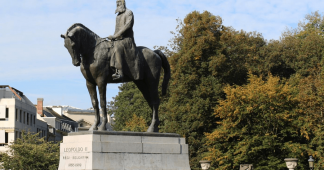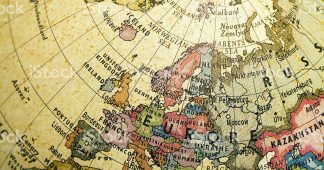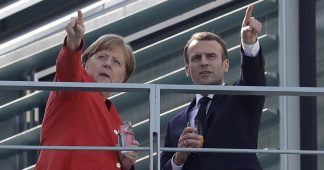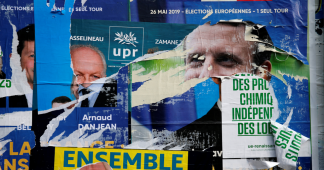The real source of neoliberalism in Europe is neither technocracy nor hegemony but a problem specific to the continent: intergovernmentalism
By Nicholas Mulder
On December 18, as tens of thousands of gilets jaunes marched across France, a group of protesters assembled at the Berlaymont, the star-shaped complex in downtown Brussels that houses the European Commission. The Flemish far-right student organization Schild & Vrienden (Shield & Friends) had organized to protest the Belgian government’s participation in the UN Global Compact for Migration, then being signed at a conference in Morocco. Calling itself the “March against Marrakech,” the rally drew a crowd of over five thousand, which thronged around the Commission building. Journalists were hounded away with shouts of “left-wing rats!” while dozens of participants were wounded and ninety people were arrested as the protesters tried to break into the Berlaymont. That the Belgian extreme right chose to oppose a UN immigration agreement by besieging the head office of EU bureaucracy was a telling decision: the ongoing identitarian revolt against globalism has tended to lump together the transnational forces it opposes.
When I was growing up in Brussels in the 1990s, the EU seemed an unlikely target for such resentment. My Dutch parents, who worked in labor law and journalism, had moved to Tervuren, a quiet town on the outskirts of the Belgian capital. Every morning I waited across from a neoclassical palace built a century earlier by King Leopold II to take a yellow-blue tram to the center of Brussels, where I attended primary school a stone’s throw from the Berlaymont. The European Union had only just come into existence, and though few of the city’s native and foreign-born inhabitants believed they were living at the end of history, there was also little open animosity. Some “migrants” arrived from the Union’s well-off new member states—Sweden, Finland, and Austria, which joined in 1995—but so did Bosnian and Algerian refugees fleeing civil war in their home countries, without meeting organized opposition. Few small European nations, including the Belgians, a population of ten million spread across three languages and seven parliaments, thought integration would be easy. But they were confident in their own ability to work around the inevitable problems, to improvise as they moved into an open-ended future.
The sense of possibility of the 1990s is very distant from Europe’s current situation. The economic crash of 2008 was a watershed moment in European politics. While leading a tremendous backlash against refugees, governments in London, Rome, Budapest, and Warsaw have proclaimed their national sovereignty under attack from a despotic EU bureaucracy. Only the neoliberal center remains committed to the actually existing common market. But many parties increasingly equate EU membership with willful submission to the dictates of an unaccountable behemoth in Brussels.
To nationalists, the EU is an archetypal globalist construction. Right-wingers rail against the European Commission for forcing native populations to accept large numbers of African and Middle Eastern refugees. They claim Europe has expanded too fast and has become too invasive, benefiting southern “free-riders” while failing to protect the fortunes of disciplined savers in northern “surplus” countries. These claims have political traction, but little basis in fact. In many respects, they overrate the generosity of EU institutions. Europe’s intake of refugees, already substantially below its temporary peak in 2015, remains embarrassingly low given its economic and institutional capacity. Northern taxpayers and banks have reaped large wealth and balance sheet gains from the bailouts provided to the Mediterranean debtors. And the European Central Bank (ECB), which tightened the screws on Greek access to capital during the depths of the crisis, is conservative even by the standards of the US Federal Reserve, itself hardly a hotbed of radicalism.
Where most of the charges that the right levels against the EU are hard to take seriously, the left has produced cogent and sophisticated critiques of the organization. Leftist skepticism about the project of integration goes back to the beginnings of the European Economic Community, but was generally a minority current; the Eurozone economic crisis and Britain’s ongoing attempts to depart from the EU have reanimated this tradition, with some arguing for a left exit, or “Lexit.” The Lexit position points to a split among the Union’s left-wing critics: varying diagnoses of the EU’s democratic deficit and neoliberal bias in turn suggest different paths to a more progressive and democratic Europe.
Currently, there are two broad varieties in left-wing anti-Europeanism. The first line of criticism is that the EU is an unaccountable technocracy constitutionally opposed to democracy. On this reading, unelected Eurocrats at the European Commission threaten national sovereignty as they enforce budgetary rules, laws, and regulations with no accountability. A related but distinct accusation is that the EU is terrible for national democracy because it is a vehicle for German empire. On this reading, the technocrats are either simply doing the Germans’ bidding, or else the Germans are responsible for long ago having rigged the rules of the union in favor of the continent’s largest and most powerful country.
These left-wing analyses focus on a real problem: the constraints of current EU and Eurozone economic policies, which have deepened and prolonged the continent’s crisis. Yet in their urge to counter the tyranny of the market, left nationalists misread the nature of the neoliberal project in European politics. Contemporary EU neoliberalism is not being orchestrated by a single powerful nation-state, with the rest of bloc as its puppets; nor is it running on tracks laid down by a transnational clique of globalists. What the left confronts today is rooted in the internal transformations that several member states underwent in the 1980s and 1990s, after which a multitude of powerful national elites cooperated to reshape European institutions in their interests.
While Germany’s indigenous variety of neoliberalism, so-called ordoliberalism, has often been singled out as the source of monetary and fiscal rigor, the EU’s turn to market discipline would never have succeeded without active contribution from the other five founding member states. French, Italian, Dutch, Belgian and Luxembourgish politicians did as much to turn the EU into a collection of “market-conforming” democracies as their German counterparts. Since then, a growing circle of national cabinets outside the core six have made the neoliberal policy consensus their own.
What this means is that the real source of neoliberalism in Europe is neither technocracy nor hegemony but a problem specific to the continent: intergovernmentalism. Accordingly, left nationalists in parties such as the British Labour Party, France Insoumise, and Germany’s Die Linke have the correct intuition about where a progressive politics can overcome neoliberalism—at the national level—but their flirtation with breaking out of the Union is the wrong strategy for achieving that goal. To address intergovernmental problems, national lefts must join forces at the European level. As voters across the Union prepare to elect a new European parliament next month, the question that confronts the European left is whether it can find the common ground needed to counter neoliberal discipline both through and beyond the nation-state.
Arguments about the neoliberal character of the EU are at some level debates about history and identity. One initial European response to the 2008 shock was to blame Anglo-American free market ideology for infecting a traditionally social-democratic continent. This was always a weak alibi at a purely material level: as Adam Tooze has recounted, Europe’s overgrown banking sector played a key role in causing the global finance crisis. The impression of European innocence is equally untenable in the realm of ideology; scholars like Quinn Slobodian have recovered the Central European origins of many key neoliberal thinkers over the last decade. Some historians of neoliberalism have thought in terms of a “road from Mont Pèlerin,” the Swiss town where the most influential network of laissez-faire economists and lawyers originated in 1947. Analytically, this argument presupposes a pattern of influence that runs outward from a single center: market-friendly ideas may have been adapted to local contexts, but they essentially derived from a single concentrated template.
But there is a difference between the concentrated point of origin of neoliberal ideas and the diffuse successes of neoliberalism as an electoral program and policy agenda. After World War II, West Germany was an outlier in that it never adhered to the kind of strongly interventionist economic policy that characterized postwar growth elsewhere. For this reason, the country plays a major role in most narratives of how the EU became neoliberal, with the reunification of Germany as a key turning point. Left-wing critics of the EU often reason backwards: if the Eurozone and EU budget treaties have disproportionately benefited Germany, then those institutions must have been German ideas to begin with. Following that logic, the entire common currency and the structure of budget discipline get cast as instruments of German power over the continent. The implication is that reclaiming national sovereignty by leaving the euro or the Union will allow member states such as France, Italy, and Spain to return to their natural inclination for big-spending statist welfare regimes. Wolfgang Streeck, the best-known left nationalist intellectual, has argued that southern European countries were structurally unfit for integration into a monetary union with Germany because their social model was premised on growing public debt and moderate inflation. More broadly, there is a widely-held view that Bonn and later Berlin forced these countries into the anti-inflationary straitjacket of the European Central Bank (ECB), itself presented by critics as essentially a copy of the orthodox German Bundesbank.
The political trajectories of the five non-German EEC countries in the 1980s and early 1990s show a different picture. Elites in these countries pursued their own agendas, for their own reasons. François Mitterrand, elected as President of France in 1981 on hopes of a socialist transformation, pursued left-wing economics for less than two years before capitulating in his infamous “turn to rigor” in March 1983, after which he transformed into the most avid privatizer in French history. Mitterrand’s liberalization agenda was run by a group of influential Socialist Party members, who eventually led a global campaign to abolish capital controls: Jacques Delors, first Mitterrand’s finance minister and later president of the European Commission; Michel Camdessus, Bank of France governor and IMF chairman from 1987 to 2000; and Henri Chavranski, who ran capital movements at the OECD. Far from victims of German hegemony, these policymakers were self-consciously trying to transform their political economies to adjust to the new world created by the end of fixed exchange rates and the onset of worldwide financialization. They wanted leaner and meaner states that would be able to preserve social provisions in a much tougher international environment.
A similar national makeover with an eye to global competition occurred in the Netherlands, where the Christian democrat Ruud Lubbers (1982-1994) forced his country’s labor unions into a new wage-suppressing compact. This allowed the Dutch to shadow the export-driven growth trajectory and hard money policies of Germany, but it was in no way done at the behest of the Germans. In the south, Italy temporarily overtook Britain in GDP in 1987 to become the world’s fourth-largest economy—the sorpasso or “overtaking”—but the unequal gains of this growth were further compounded by an enormous expansion in public debt. Following the implosion of the entire postwar Italian political system in 1992, Silvio Berlusconi and his successors began to pursue privatization and deregulation in earnest. A similar slash-and-burn procedure in Belgium under prime minister Wilfried Martens (1981-1992), who lowered taxes and nearly doubled the government debt, set the stage for his successors to cut back entitlements.
Yet it may be the Duchy of Luxembourg, the smallest of the founding six, that best illustrates the conversion of Europe’s national elites to neoliberalism. A hilly territory with a population under 400,000 people, Luxembourg’s steel-making economy supported a Christian Democratic welfare state for much of the postwar period. The duchy’s interstitial position and its middle-of-the-road politics also made it a reliable source of European Commission presidents: prime minister Pierre Werner proposed a common currency as a strategy to gain independence from American hegemony as early as 1970. But as free market ideas swept European capitals in the 1980s, the meaning of further economic and financial integration changed. Under prime minister Jacques Santer (1984–1995), the duchy reinvented itself as a global corporate tax haven and a sanctuary for money market funds from around the world. Santer’s agenda was executed by his right-hand man, the affable and self-effacing lawyer Jean-Claude Juncker.1
In the almost seventy years since integration began, Luxembourgers never wavered in their support for the European project. What they grasped early was its essentially intergovernmental nature. In outcome if not in form, European institutions resemble not the German Reich—an unbalanced federation once dominated by Prussia—but rather the Holy Roman Empire, an idiosyncratic and extraordinarily long-lasting machine that excelled at the protection of small states. Far from creating a borderless free-for-all dominated by large countries, the EEC enabled welfare, industrial, and agrarian policies that strengthened national sovereignty (a fact demonstrated in historian Alan Milward’s still unparalleled study of European integration, The European Rescue of the Nation-State).
When the European Union was created in 1993, the internal neoliberal reorientations of the core six meant that it acquired a more disciplinary character than its predecessor. The two most important institutions of the new EU were the Stability and Growth Pact (SGP), and the European Central Bank. The SGP was an intergovernmental treaty which expressed the desire of national elites in the core six to remake their own countries as “market-conforming” democracies that could be independently resilient and competitive; accordingly, it limited annual budget deficits to 3 percent of GDP and total government debt to 60 percent of GDP. The force of these strictures, however, has turned out to be much more limited than first imagined: both Paris and Berlin broke the treaty’s debt and deficit guidelines in the first decade of its existence. There was no sound enforcement mechanism against budgetary delinquents, so the SGP remained only as stringent as the will of national governments to abide by it. Ordinarily the international bond market would have provided another form of discipline against large-scale government spending; investors would usually refuse to fund unbalanced budgets. But the bond market’s disciplinary effect was smothered by an enormous global credit boom unwitnessed in capitalist history which began in the early 2000s. On the eve of the crisis Greece enjoyed borrowing costs only somewhat higher than those of Germany.
The ECB too functioned as a collaborative platform rather than a monetary dictator. For the first decade of its existence it did not have to restrain members from inflationary indiscretion, because the national central bankers represented on its board had already done so in their own countries for years. The bank’s first chairman, the Dutch social democrat Wim Duisenberg, had been shaped by the pursuit of a strong guilder in the 1970s and 1980s as the only guarantee Dutch of success in the world economy—a belief he now held out as a model for other member states to follow.
Europe’s institutional turn to neoliberalism in the 1980s and 1990s was thus driven not just by globalist ideas and external pressures, but also by the primacy of domestic politics. In a chaotic and contingent process that took place independently in different countries, the old postwar balance between capital and labor was displaced by a new consensus among business groups, policymakers, and politicians of both center-left and center-right. Rather than a hegemonic Germany, it was small countries such as the Netherlands and Luxembourg, as well as the Nordic states that entered in 1995, especially Finland, that became crucial in the expansion of markets across the continent. It was on new member states rather than on its older Western, Southern and Central European members, that the Stability and Growth Pact imposed real discipline. Following the strictures of the SGP became the litmus test for entering the common currency area of the Eurozone after 1999. This was why the states that came to constitute the Eurozone after 2002 acquired a dominant, though not all-powerful, role within the European Union: their elites believed that they had successfully transformed themselves into the kind of economies capable of global competitiveness. Euro membership unlocked access to enormous international capital flows, which loosened the stringency of SGP spending limits and a common monetary policy.
The same skills that had served small countries’ elites in constructing consensus at home were now applied to charming and cajoling new entrants into conformity. By 2004, when eight former Communist countries in Central and Eastern Europe plus Malta and Cyprus joined the EU, the market-conforming policy package was ready for immediate adoption by the neophytes. Keen to break with the remnants of state socialism, post-Communist elites from Sofia to Tallinn and from Bratislava to Bucharest were understandably enthusiastic about their incorporation into the Union in the 2000s. EU accession spread not just market forces, but also hundreds of billions in EU structural and regional funds and access to the rapidly growing pool of Western bank credit. The combination of bank loans, capital investment, and remittances from migrant workers in western Europe promised rapid growth after lackluster performance in the 1990s. While this path to prosperity required enormous internal change, it was not imposed from above; many goverments in new member states enthusiastically pursued it themselves, like the EEC states who had first embarked in this direction in the 1980s.
Europe’s neoliberal transformation reached its apogee in the 2009 Lisbon Treaty, the preface of which defined the European Union as a “social market economy”—the original ordoliberal slogan developed in 1940s West Germany, in which the state’s economic role was that of a referee, not a player.2 The measure of this victory of market conformity was how many social democratic governments implemented these reforms — Gerhard Schröder’s SPD in Germany, Lionel Jospin’s PS in France, Romano Prodi’s L’Ulivo coalitions in Italy, Blair and Brown’s New Labour in Britain— and how avidly they did so. The multiple political paths to the Lisbon Treaty, a decades-long process of self-guided convergence, are very different from the single “road from Mont Pèlerin” conceived as the centralized diffusion of market fundamentalism. The first step to a progressive European politics is to recognize that this neoliberal consensus exists in every EU member state, and that it accordingly must be fought at the national level.
All the same, it is undeniable that the provisions of the SGP and its super-charged 2011 successor, the so-called Fiscal Compact, still reign supreme in Europe. Where does this conservative economic impulse in the economic stance of the EU originate? Much of it comes from the Council of the European Union. This intergovernmental body is, as Perry Anderson described it in 1996, “a quasi-legislature of ministerial sessions, shielded from any national oversight, operating as a kind of upper chamber,” and as powerful and conservative as the US Senate. What even Anderson could not foresee was that the management of the euro would create an inner citadel within this senate. Created in 1998, the Eurogroup unites the nineteen finance ministers of the Eurozone countries. It is not an official European institution, and its legal existence hinges on a single article of the Lisbon Treaty, which notes it should “meet informally.” With a tremendous amount of unaccountable power, the Eurogroup represents the main obstacle for the European left’s fight against austerity.
The Eurogroup’s disciplinary force was on full display in its confrontation with Greece’s left-wing Syriza government in 2015. What ultimately broke the Greek resistance to austerity was the assembled power of eighteen democratically elected finance ministers, including from other deeply crisis-affected countries, Ireland, Portugal, Spain, Italy, and Cyprus, attacking the nineteenth. Their finance ministers came from center-right pro-market coalitions, and had subjected their own countries to draconian budget cuts in the preceding years. They were thus determined not to let Athens off the hook. It was not supranational bureaucracy but intergovernmental agreement on austerity and against more generous debt restructuring that forced Syriza into conformity. The result, in these minister’s home countries as well as in Greece, was an enormous social and economic bloodletting.
The Eurogroup isn’t subject to external democratic oversight. But its members are ministers from democratically-elected national governments. Decision-making about European budgets is thus not so much democratically deficient as democratically imbalanced: it enables coalitions of national governments to impose conservative budgets on the rest of the currency zone (and through economic spillover effects, on the Union as a whole). In theory, a European Parliament with its own political parties could be a powerful countervailing force against the Eurogroup’s disciplinary consensus. However, the current European Parliament is dominated by unwieldy and contradictory constellations of partners. Legacies of postwar Christian democracy and centrism predominate, so that until last month Angela Merkel and Viktor Orbán shared the same umbrella party, whereas progressives are scattered across the left-green, social-democratic, green, and liberal party blocs. Such a fractured assembly cannot stand up against the enormous power of the EU’s intergovernmental bodies, which remain dominated by the national heads of government by whose grace European policies stand or fall.
Emmanuel Macron has tried to enlist Merkel’s support to expand Eurozone institutions, proposing an autonomous Eurozone budget and even a parliament. Yet these reform efforts are currently being blocked not by a single hegemonic country, or an out-of-control bureaucracy, but by a group of small countries, the Netherlands, Denmark, Sweden, Finland, the three Baltic states, and Ireland, which officially call themselves the New Hanseatic League. Like the Old Hanseatic League, in which the prosperous merchant cities of the North Sea and the Baltic united to protect their wealth from taxation in the Holy Roman Empire, the small northern European democracies have checked the larger member states—with the important difference that they are not beleaguered by any external force except the budgetary treaties that they wrote themselves.
The story of how Europe came to replace policies of support with policies of discipline on a continental scale explains the depth of the current crisis. But it does not explain why a broad left or even center-left revival has failed to materialize. Instead European governments have doubled down on both austerity and nationalism.
Across the continent, traditional working-class support for center-left parties has all but evaporated over the last three decades—a phenomenon known as “Pasokification,” after the fate of Greek social democratic party PASOK, whose role in exacerbating Greece’s financial boom destroyed its support after 2009. In Britain, Labour was savaged in both the 2010 and 2015 elections before its reorientation under Jeremy Corbyn. But it was in 2017 that voters really punished the Pasokified social democratic parties of Europe’s old core. In the Dutch parliamentary elections in March, the Labor party (home to Syriza-crushing Eurogroup chairman Jeroen Dijsselbloem) suffered a defeat unprecedented in its seventy-year history. Macron’s centrist victory in the French presidential elections in May cannibalized both votes and personnel from the moribund Parti Socialiste. By September, no one was very surprised when the German SPD logged its worst electoral results since the end of World War II.
While the parliamentary left disintegrates, the combination of economic crisis and right-wing anxiety about migration has produced a nationalist reconfiguration of neoliberalism, what the economic geographer Reijer Hendrikse has aptly called “neo-illiberalism.” Although they differ in their views about European and international institutions and migration, every European center-right party has become more nationalistic. The most egregious and well-known example of this trend is Viktor Orbán and his Fidesz party. From its origins as a liberal formation in the 1990s, Orbán turned into a chauvinistic nationalist outfit which enables oligarchic self-enrichment for its allies while rewriting the Hungarian constitution to disavow the country’s role in the Holocaust, and placing refugees from the Middle East in concentration camps.
A broader process of “Fideszification” has affected democracies across the continent. Liberal and conservative center-right cabinets dependent on the far-right for coalition support have been the most vulnerable. Both Denmark and Austria are in this position. In 2016 the Danish government pioneered a law stripping asylum seekers of their valuable possessions, including jewelry; this policy was soon adopted by Austria’s 32-year-old chancellor, Sebastian Kurz, a crusader for closed borders who rules together with the neo-fascist FPÖ. Meanwhile in Rome, Matteo Salvini’s Lega has turned from a small pro-business separatist party into a powerful Italian nationalist formation increasingly popular for its brutal treatment of refugees and its open defiance of Brussels.
Even in more ostensibly respectable parties the trend is similar. Dutch prime minister Mark Rutte has positioned himself as an enlightened broker on the issue of immigration. But his recent denunciation of “white wine–sipping big city elites” suggests that he too is playing the game of Orbán and Kurz. Rutte openly tried to impose immigrant intake quotas on eastern European countries. But such European coordination is internationalist only in appearance; quotas enable Rutte to appease the fast-growing Dutch far right by accepting fewer entrants into the Netherlands. In 2017 he campaigned with Nixonian language on behalf of a “silent majority” who want foreigners to “act normal or leave.” Meanwhile, the Dutch cabinet has deflected the European Commission’s attempts to rein in the Netherlands’ tax haven function for multinational corporations. Yet the overall effect has been to cede discursive control of Dutch politics to the far right, whose newest incarnation, Forum for Democracy (FvD), became the largest national party in provincial elections last month. In Germany, the emergence of the ultra-nationalist Alternative for Germany as the third-largest party in the Bundestag has ended the political hegemony of Merkel’s CDU, forcing it to shift rightward on immigration and restricting its room for maneuver on future European initiatives.
The European center-right’s nationalist turn combines increased openness to capital mobility and pro-business reforms with a crackdown on immigrants and non-native populations. Fideszification is a strategy of balance. Able to defend the status quo when possible and prepared to flirt with far-right radicalism when necessary, the right is positioned to benefit from prudential voters and angry voters at the same time. This has given it a natural dominance in countries in which the left has been split between defeated Pasokified center-left parties and a Euroskeptic far left.
Nearly absent in this landscape is a progressive left-wing politics that is both anti-neoliberal and pro-European. Yanis Varoufakis’s gambit to combine Eurozone membership with expansionary economics and debt relief in the spring of 2015 ended in defeat. The former Greek finance minister has continued his struggle against neoliberalism at the pan-European level through the creation of a new “progressive international,” the Democracy in Europe Movement 2025 (DiEM25), which will stand in the spring 2019 European parliamentary elections. Under the banner of a global Green New Deal, DiEM25 has made common cause with the progressive wing of the US Democratic Party under Elizabeth Warren, Bernie Sanders, and Alexandria Ocasio-Cortez. The movement’s agenda is smart, but it is doubtful if it can command broad-based popular support across Europe. The radical left in countries like Britain and France suffers from the opposite problem: they have electoral momentum, but are deeply divided over whether they want to be part of the European project at all. Under these conditions the prospects of a left Europeanism are uncertain.
Yet there is an important exception. While the name Lisbon connotes the triumph of the neoliberal model in Europe, it may also foreshadow a possible way out of that model’s clutches. Since November 2015, Portugal has been the only Eurozone and EU member state which has been able to combine left-wing economic and social policies with material recovery while remaining committed to European institutions. The Portuguese progressive experiment under Lisbon’s former mayor, the Socialist prime minister António Costa, illustrates one possible path for the European left: capturing power in national elections and rolling back budget cuts and privatizations, thereby boosting growth and reducing debt.
This national leftist success has avoided being crushed by the Eurogroup due to a combination of luck and skill. It began with a major gaffe by the body’s chairman, Dutch finance minister Jeroen Dijsselbloem. In March 2017, Dijsselbloem told the Frankfurter Allgemeine Zeitung that while he believed in solidarity, the crisis-affected economies “also have obligations. You cannot spend all the money on drinks and women and then ask for help.” This bigoted remark illustrated how Eurozone budget discipline has been sold to northern electorates based on crude cultural stereotypes, as a cure for Mediterranean spendthrifts. The remark was met with a wave of indignation across southern countries, making a continuation of Dijsselbloem’s tenure difficult. Four candidates, all from small member states, came forward to replace him, and the winner turned out to be the only southerner who stood for election, Portugal’s finance minister Mário Centeno. A Harvard-trained economist and former academic, Centeno was regarded by many of his northern colleagues as a potential troublemaker when he took office in the fall of 2015. But Portugal’s recovery spoke for itself, and when he became Eurogroup chairman in January 2018, Centeno was not just its first chairman from outside the core six, but the first to represent an anti-austerity socialist government in the history of the euro.
Portugal has been helped by the forbearance of the European Central Bank. As the only European institution that is fully independent from national governments, the ECB continues to have the potential to upset the political priorities of monetary and fiscal conservatives. Since 2012, ECB head Mario Draghi has used his autonomy to pursue monetary easing policies, angering conservative cabinets from The Hague to Helsinki to Berlin. As Danilo Scholz and Adam Tooze have written in the German periodical Merkur, a central bank committed to economic expansion could provide much-needed political breathing room for the continent’s progressives. Their proposal works backward from the results of the technocratic institution-building of the 1990s. An even more immediately useful political strategy might be what Portugal’s left-wing coalition has done: using national electoral victories to enter European institutions, following in the tracks of the original neoliberal revolutionaries of the 1980s. From there, the left will be in a better position to build trans-continental party coalitions to break open and renegotiate the EU’s budgetary treaties.3
There is room for cooperation between left-nationalists and progressive internationalists. Europeanist goals can be achieved by national means. Still, inaugurating a new progressive stage in the European project will succeed only if left-wing parties recognize Europe as the field of power to be contested. National left-wing parties should focus on economic inequality instead of following the right into anxieties about immigration. Progressive internationalists can help them by connecting national egalitarian efforts to European institutions, and deepening the regulatory powers which Brussels has in antitrust and human rights law, environmental and data protection, regional development, and banking oversight. Those skeptical about such cooperation should look back to the ways the process of European integration after World War II strengthened rather than undermined national belonging. Only through these means can the European Union offer something promising to a region otherwise likely to become a world-historical backwater in the twenty-first century: a modicum of social democracy in one continent.
- Juncker personifies the process of European integration, in which countries large and small have tried to overcome their complex pasts through a combination of depoliticization, institution-building, and treaty-writing. Born to a father who was drafted to fight in the Wehrmacht on the Eastern Front, Juncker was the crucial middleman in Franco-German convergence leading up to the adoption of the euro. In December 1996, Juncker, then the Luxembourgish prime minister, received the moniker “Hero of Dublin” for brokering a deal on budget discipline between German chancellor Helmut Kohl and French president Jacques Chirac. From the end of the Cold War until today, Juncker’s political career has been marked by extraordinarily long stints in central positions—Luxembourg’s finance minister for twenty years (1989-2009), its prime minister for eighteen years (1995-2013), president of the Eurogroup of finance ministers for eight years (2005-2013), and president of the European Commission since 2014—which he has fulfilled with a singular lack of glamor, notwithstanding occasional bouts of inebriation at international summits. ↩
- Correction: April 30, 2019: An earlier version of the essay mistakenly dated the phrase “social market economy” to the 1960s. It in fact dates back to at least the 1940s, when it was adopted as part of the CDU platform. ↩
- The pressure to soften budget discipline will only increase as national governments will seek not exit from the EU, but external relief from austerity—Italy’s decision last month to join China’s Belt and Road Initiative highlights the costs to European unity of using austerity as a substitute for stimulatory economic policy.











